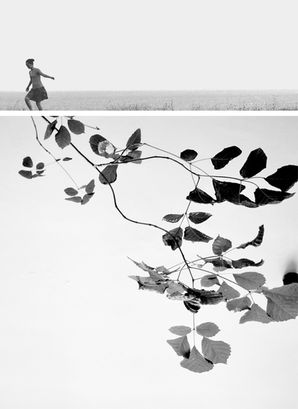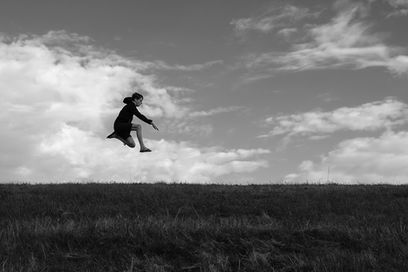
NOSTALGIA
December 2, 2022
INTERVIEW
PHOTOGRAPHY Monika K. Adler
INTERVIEW Melanie Meggs
Monika K. Adler is a celebrated photographer and avant-garde filmmaker whose work captures the struggles of life, the power of human memory, and the beauty of the natural world. Based in London since 2012, Monika was born in Poland, and graduated from The European Academy of Photography in Warsaw and the Wojciech Gerson’s National School of Fine Arts. After that she moved to Paris, where she photographed the life of the city and its artistic Bohemia, and had her first solo show. Living a vagabond lifestyle and travelling approximately 180 places in Europe and New York, Monika created a photography project called 'Travel no End', a poetic documentary journal of contemplating daily life in its deepest form, comprising of 200 prints. Her transgressive photography series, 'Chernobyl of Love', earned her international recognition for its thought-provoking portrayal of life in the wake of the 1986 nuclear disaster in Ukraine.
Her poetic and experimental films have screened at several film festivals around the world, including the Edinburgh International Film Festival, International Film Festival Rotterdam, Hot Docs Canadian International Documentary Festival, and the San Francisco Documentary Festival.
Monika uses her lens to capture emotions, revealing the truth behind her lens in captivating ways. She has been praised for her bold and daring approach to photography that pushes boundaries and encourages viewers to reflect on their lives. Her work is a testament to her love of storytelling and highlights her commitment to exploring the power of human connection and memory. As a master of her craft, Monika has skillfully utilized black and white photography to bring to life stories of identity, consumerism, sexuality, and history.
Her most recent project, NOSTALGIA, is a powerful exploration of the resilience and strength of immigrants who have experienced war. Her work speaks for itself and conveys a deep appreciation for the art of storytelling. In her own words she tells a poetic and emotional story of an immigrant's remembrance of a life disrupted by war.
“Cold earth and blackened gunmetal. Taking with you only the most precious and essential. Cast alone amongst thousands; forced, overnight, to leave their home, their family, their animals, and the places they love; fractious, precarious, putting their lives in the hands of strangers. You still feel it, every moment. It’s hard to forget who you used to be, and what was once yours. The new identity is painful, one described by your nationality, an absence, and the place where your heart still lies.
Through memories, you belong to a different place, landscape, climate, and environment. In your homeland the seasons had another smell and colour; the rain felt different, the sun was warmer on your face; the fruit sweeter; the trees rustled unlike anywhere else. These surroundings shaped you, and made you remember who you are, and where you came from.
You are a stranger in a new place. People don’t trust you. Under apparent kindness, eventually hostility will emerge. They don’t know if you are a victim or aggressor, but you are indifferent to their judgement. You are tied to your nostalgia, which kills you every day.
Overburdened by memory, you dream about a return to the land where you left your soul.
But is it possible? Will there be anything to come back to? Can your motherland still your home? Does a past life that was razed to the ground have any chance of being reborn? If so, in what form? How to recognise people you don’t know anymore? Will they recognise you? Will your memory survive in them, or will you be forever a stranger? How to forget those who suffered: killed, raped, displaced, and robbed of everything that is human? For how long should one remember the barbarity of the enemy, and how can we ensure their crimes will not fade from the pages of history books? How will they not become rationalised to people of good will? Will the world forgive and forget too soon?
These invaders never respect occupied lands and the human beings who created their own worlds there. Filled with contempt and hatred, they wipe out every shred of past existence. They are ready to uproot every tree, annihilate every home, burn libraries, museums, galleries, bomb opera houses and theatres to install a new order, culture, and new language.
Despite the immensity of their cruelty, no punishment has ever befallen them, or will.
For history, the death of the masses means nothing. The games of clowns and psychopaths at war one day end. Weaponized human bodies are finite and cannot fight forever. The idea of peace sounds enthusiastic, but rebuilding takes time and wounds never heal. They will live on in the next generations, as trauma, and collective memory.
Afterwards, is it possible to return, and to what end? What of those who had to flee somewhere to a foreign land, to start again amongst seemingly friendly people?
Emigrant limbo: the state between two different pasts. Arriving in a new land is also history.”

“In the end, it appears NOSTALGIA is a state between reality and sleep; a haven, a place of exile and eternal seclusion, where you can immerse yourself in a childhood landscape outside the contemporary narrative.
A kaleidoscope. You shift the images in your head, one on top of another, and turn them upside down: colours, smells, sounds, feelings and events mix, one in the other. For a moment, you’re where you belong — no longer a stranger.”
IN CONVERSATION WITH MONIKA K. ADLER
In this interview with The Pictorial List, we speak to Monika to about how she arrived at this project and her journey into her passion for storytelling in her photography and her films.
THE PICTORIAL LIST: Hello Monika, firstly please tell us something about yourself. What would you say first drew you to photography?
MONIKA K. ADLER: I was born in Gostynin, Poland, during the late communist period. When I was 13, I left there to study art in Warsaw. Afterwards, I led a bohemian lifestyle travelling across Europe, and spent time in Paris and New York. Those years shaped me as an artist.
Since 2012, I’ve worked in London on photography, video art, and film, and have exhibited and published around the world. I’m also working on a feature film: Sick Bacchus.
What first drew me to photography? The pure joy of stopping time.
TPL: How would you describe your photography, and what would you say you are always trying to achieve artistically?
MKA: I work in black and white, conceptual, fine art photography that addresses the socio-cultural construction of memory, history and trauma, identity, and sexuality. In this, I’m interested in touching upon unseen truths: the ineffable.
TPL: Talk us through the narrative of NOSTALGIA. When and how did this project first manifest for you? What was the inspiration? What journey are you taking us on? What have you learned from this project that has surprised you?
MKA: Nostalgia tells the story of an immigrant’s remembrance of a life disrupted by war. The idea for the series came to me on 24 February 2022, when Russia invaded Ukraine, and thousands of Ukrainians headed to the Polish border. I felt a deep sense of identification with the experience of other Central and Eastern Europeans, and our shared history, that made me feel alive again, because the perfect world of consumerist London has a way of killing you inside. In the end, ‘Nostalgia’ reminded me of how Polish I am. It was profound.
TPL: What importance does storytelling or key themes hold for you in your photography and filmmaking?
MKA: Storytelling is crucial. It adds blood to the image and sets it in time and space. I believe in the strong relationship between photography, film, and literature.
Everything around us has the potential to become a great story. I love uncomfortable narratives. The act of provocation is a life’s breath.
TPL: Could you tell us how growing up in Poland has inspired your work today? What special qualities unique to your home country influence both your photography and filmmaking and the way you portray your community?
MKA: History has somehow influenced the work of all Polish artists. We’re part of a bleeding wound which doesn’t heal across generations. I explore our national demons and mysteries through symbolic, dream-like, still and moving images anchored in the collective unconscious.
TPL: There is an intimacy with your subjects, an up close and personal engagement. Do you know your subjects? Please tell us about the emotion you share with your subjects, and what this brings to your work.
MKA: My subjects are close to me, for example: my husband Aeon Rose, yet their meaning in my work is not personal but universal. They function as everyman/woman. I’m there as an emotionless observer; the viewer’s omniscient eye.
In nostalgia, every time you close your eyes, you reach home. You didn’t die, and you will survive.

TPL: Do you have any favourite artists or photographers you would like to share with us, and the reason for their significance?
MKA: Stanisław Ignacy Witkiewicz (Polish writer, painter, philosopher and photographer active before World War I and during the interwar period), Francesca Woodman and Helmut Newton, rebellious and charismatic, inspire me; pure, and honest in exposing their longest shadows and deepest desires. This is the essence of an artist’s life.
TPL: What are some challenges that you have faced as a photographer?
MKA: I’ve had a hard experience, but I’ve already crossed and drunk from the River Lethe (the river of forgetfulness in Hades) and now I have so much freedom in my work that nothing and no one can challenge me.
TPL: How do you educate yourself to grow in your photography?
MKA: I feel developing your consciousness is an essential education in any creative work. You see into your inner self and the depth of your being, and it reflects in the images you produce. I study human psychology and metaphysics, and explore progressive dreaming. This establishes a foundation for ideas and shows us how to ‘see’ not just ‘look’ when you release the shutter.
TPL: What was the first camera you ever held in your hand, brought to eye, and released a shutter on? For this project you photographed with an Iphone 7+, do you use any other equipment? How does this equipment help you in achieving your vision in your photography? Do you have anything on your wishlist?
MKA: My first camera was PRAKTICA MTL3; a gift my father sent me from East Berlin, where he lived and worked in the late 80s. The last 12 years, I’ve used only iPhones. I don’t think that will change soon.
TPL: Are there any special projects that you are currently working on that you would like to let everyone know about? What are some of your photography goals? Where do you hope to see yourself in five years?
MKA: Nostalgia is a photographic diptych. Next year I’ll work on its second part. A two volume photography book will result. I’m also working on the completion of Sick Bacchus: a feature film. Where do I hope to see myself in 5 years? Let’s leave this open. I love the unknown.
TPL: “When I am not out photographing, I (like to)…
MKA: I write short stories and screenplays. To create them I study human nature. I read obsessively, not only good literature but also tabloids and historical newspaper archives from 1700s to 2000s. In between them, a brutal, almost vulgar existence merges with something deeper and more elusive.

Monika K. Adler's photography and avant-garde films are a testament to her ability to capture the intricacies of human life through her lens. Her work encourages us to reflect on our lives and appreciate the power of human connection and memory. We thank Monika for sharing her intimate and pertinent story. Make a connection and be inspired through her photography.







































